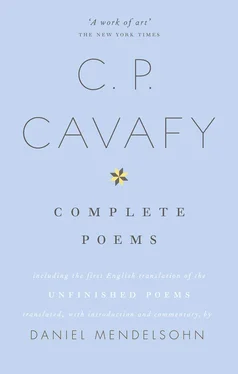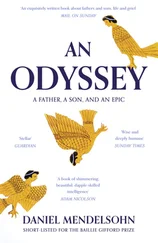Cavafy’s content also merits renewed attention—both the specific subjects of individual poems and also his larger artistic project, which in fact holds the historical and the erotic in a single embrace. For this reason I have provided extensive Notes in addition to a general Introduction. A necessary aspect of the project of presenting Cavafy anew to a public that enjoys poetry but is unlikely to be familiar with many of the eras and places where he likes to situate his poems (late Hellenistic Syria, say, or the fourteenth century in Byzantium; Seleucia, Cyrene, Tigranocerta) is to provide readers with the rich background necessary to decipher those works. Cavafy seems to have inhabited the remote past as fully as he inhabited the recent past, and so to appreciate his poems fully, with their nuances and, so often, their ironies—the latter in particular arising from the tension between what the characters in the poem knew while events were transpiring and what we know now, one or two millennia later—the reader also needs to be able to inhabit both of those pasts; to know what they knew then, and to know what we know now, too.
Readers will also find commentary on certain poems with subjects and settings that might not, at first, appear to require elucidation: poetic creation, erotic desire, the recent past. And yet however familiar or obvious to us the emotions that Cavafy describes may seem to be (the feeling of being “special”—of belonging to a rarefied elite—that comes with being a creative artist), or however self-evident or transparent the circumstances about which he writes, it is worth keeping in mind that the poet’s presentation of such themes was often deeply marked by his reading in the poets and authors of his time—or unexpectedly indebted to his lifelong immersion in ancient history. Our understanding of an ostensibly simple short poem like “Song of Ionia,” for instance—a poem that seems to revel straightforwardly in the fizzy possibility that even today the old gods still dart among the hills on the coast of Ionia—is deepened when we learn that it stemmed from the poet’s poignant vision, while reading Gibbon’s Decline and Fall of the Roman Empire, of the late Roman emperor Attalus (who was born in Ionia) “singing a touching song—some reminiscence of Ionia and of the days when the gods were not yet dead.” By the same token, “But Wise Men Apprehend What Is Imminent,” a poem about the special perception granted to certain gifted men, begins with an epigraph from an ancient biography of the first-century B.C. sage Apollonius of Tyana; but the reader who is given a note explaining who Apollonius was, without being made aware of the strong influence exerted by Baudelaire and the nineteenth-century French Parnassian school on the young Cavafy’s thinking about poetry and “special” vision, is being deprived of a full appreciation of the poem.
That Apollonius poem, which comments implicitly on the role of the artist in the present even as it invokes a very ancient text, embodies a crucial aspect of the entire Cavafian oeuvre. Despite the persistent tendency to divide Cavafy’s poems into two categories—scholarly poems set in the ancient world, and poems about sexual love set in a more or less recognizable present—there is an overarching and crucial coherence to the work as a whole, one we can grasp only when we unravel the meaning of the poet’s famous description of himself as not “a poet only” but as a “poet-historian.” To fail to appreciate his unique perspective, one that (as it were) allowed him to see history with a lover’s eye, and desire with a historian’s eye, is to be deprived of a chance to see the great and moving unity of the poet’s lifelong project.
The Introduction that follows provides a brief survey of the life, in order to give readers a sense of who Cavafy was “outside his poetry”; an extended critical appreciation of the work; a discussion of Cavafy’s handling of formal devices such as rhyme, meter, and enjambment; a note on the arrangement of the various groups of poems in this volume (always a thorny issue in the case of a poet who himself never published a complete collection of his poems); and, finally, an overview of the “Unfinished Poems,” the thirty nearly complete drafts that the poet left among his papers at his death, and which appeared in English for the first time in my translation of The Unfinished Poems (2009). It is my hope that the essay will serve to do what an Introduction is supposed to do if we take seriously the etymology of the word, which is to lead someone into something—the something, in this case, being a destination every bit as worthwhile as the journey.
IN ONE SENSE, it was an unexceptional life—or, at least, no more exceptional or distinguished than the lives of certain other great poets, in whom the richness of the work stands in striking contrast to the relative uneventfulness of the life. (Emily Dickinson, say.) Constantine Petrou Cavafy—the Anglicized spelling of the Greek Kavafis was one that Cavafy and his family invariably used—was born in Alexandria in 1863, the youngest of seven surviving sons of parents whose families were not at all untypical of the far-flung Greek diaspora, with its hints of vanished empire. Their roots could be traced not only to the Phanar, the Greek community clustered around the Patriarchate in Constantinople, and to Nichori (Turkish Yeniköy) in the Upper Bosporus, but also to Caesarea, Antioch, and to Jassy, in present-day Moldavia. His father, Peter John Cavafy, was a partner in a flourishing family business devoted to corn and cotton export that eventually had offices in London and Liverpool as well as in several cities in Egypt; after moving from Constantinople to London, he finally settled in Alexandria, which was ruled at the time by the Muslim Khedive but had a large population of Europeans. There he would be considered one of the most important merchants in the mid-1850s—not coincidentally, a time when the Crimean War resulted in a steep rise in the price of grain. The poet’s mother, Haricleia Photiades, the daughter of a diamond merchant from Constantinople, counted an archbishop of Caesarea and a Prince of Samos among her relations. At the height of their wealth and social success in Alexandrian society, the parents of the future poet had, in addition to their other servants, an Italian coachman and an Egyptian groom. Said Pasha, the Egyptian viceroy, paid attentions to Haricleia that were, if we are to judge from the photographs of her, purely a matter of politeness; Peter John received a decoration from the Khedive at the opening of the Suez Canal.
What effect the memory of such glory and prestige—carefully tended and endlessly polished by his mother long after she’d become a widow living in not very genteel poverty—might have had on her impressionable and imaginative youngest son, we can only guess at; but it is surely no accident that so much of Cavafy’s poetry is torn between deep sentiment about the lost riches of the past and the intelligent child’s rueful, sharp-eyed appreciation for the dangers of glib nostalgia. For his father’s premature death, when Constantine was only seven, would bring hard times to Haricleia and her seven sons, from which the family fortunes would never really recover: Peter John had lived well but not wisely. For several years the widow Cavafy and her three younger sons ambled back and forth between Paris and London and Liverpool, relying on the generosity of her husband’s brothers. They stayed in England for five years, where Cavafy acquired the slight British inflection that, we are told, accented his Greek. When it became clear that the surviving brothers had hopelessly bungled their own affairs, Haricleia returned to Alexandria in 1877, when Cavafy was fourteen. With the exception of a three-year sojourn in Constantinople, from 1882 to 1885, following the British bombardment of Alexandria (a response to Egyptian nationalist violence against some of the city’s European inhabitants; the bombardment largely destroyed the family home), Cavafy would never live anywhere else again.
Читать дальше












